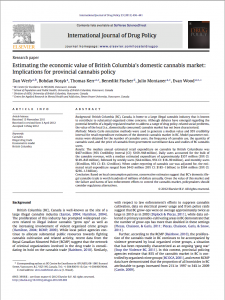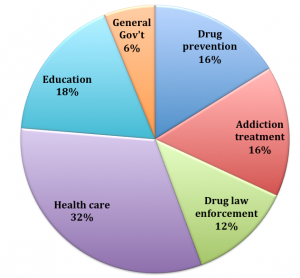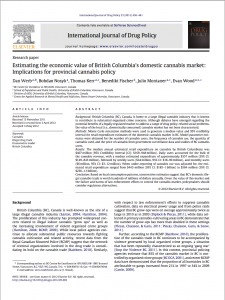 British Columbia’s cannabis market could generate more than $2.5 billion in tax revenue over next five years
British Columbia’s cannabis market could generate more than $2.5 billion in tax revenue over next five years
New study challenges argument that BC’s cannabis market cannot be taxed
Vancouver, B.C. [November 20, 2012] — Based on current consumption patterns, British Columbia’s domestic cannabis market could be worth more than $500-million annually, according to a new study by a coalition of researchers from the University of British Columbia and Simon Fraser University.
The study, published this month in the peer-reviewed International Journal of Drug Policy, is the first to estimate the size of B.C.’s domestically consumed cannabis market using provincial surveillance data. Researchers found that the estimated retail expenditure on cannabis by British Columbians was approximately $443-million to $564-million annually. The study concludes that regulating the provincial cannabis market could provide government with approximately $2.5 billion in tax and licensing revenues over the next five years.
“If you begin to stand back and calculate just how much potential tax revenue is instead going to fuel organized crime, it really highlights how we need to start questioning our current approach,” said Dr. Evan Wood, senior author of the study and Canada Research Chair in Inner City Medicine at UBC. “The results demonstrate how cannabis is such a highly lucrative and reliable source of income for organized crime, and that a regulated system in B.C. could generate significant tax revenue for services that actually address community health and safety.”
Provincial policing agencies estimate that 85% of the cannabis market in B.C. is currently controlled by organized crime groups. Data on electrical power usage and from police raids suggest that the number of cannabis grow operations in the province nearly doubled between 2003 and 2010, further demonstrating the increasing involvement of organized crime groups in the domestic production and distribution of cannabis. This increase in gang activity has also corresponded with rising gang violence in the province. In 2009, the RCMP reported 276 incidents of drive-by shootings in B.C.
“The enormity of B.C.’s illegal cannabis market demonstrates the failure of law enforcement efforts to rein in the illegal cannabis trade,” said Neil Boyd, Professor, School of Criminology at Simon Fraser University. “B.C.’s cannabis prohibition laws have proven to be ineffective, instead fueling gang activity and violence in communities throughout the province and across our borders.”
U.S. ballot measures provide model for taxation and regulation of cannabis in B.C.
Two U.S. states, Washington and Colorado, recently passed ballot measures approving the legalization of cannabis for adult use under a strictly regulated system. In Washington, voters approved Initiative 502, which creates a 25% tax on the sale of cannabis, 55% of which would be directed to health care, 25% for drug abuse treatment and medication, 1% for cannabis-related research and the remaining 19% directed to general revenue. Estimates have suggested that the revenue generated under this system could exceed $500-million annually, potentially more than state revenues generated by either tobacco or alcohol.
A previously unreleased Angus Reid poll asked British Columbians how they would allocate funds under a provincial system taxing and regulating the adult use of cannabis.
- 31% of British Columbians believe the most effective way to allocate funds derived from cannabis tax revenue would be toward drug prevention and addiction treatment
- Another 31% would allocate cannabis tax revenue to health care
- 12% would allocate funds to drug law enforcement
The Angus Reid poll was commissioned by Stop the Violence BC (STVBC), a coalition of academic, legal, law enforcement and health experts concerned about the links between cannabis prohibition in B.C. and the growth of organized crime and related violence in the province. Since launching a year ago, STVBC has received high-profile endorsements from across the law enforcement, public health and political sectors, including the Health Officers Council of B.C., four former mayors of Vancouver and four former B.C. attorneys general.
“B.C.’s law enforcement efforts have proven to be completely ineffective at reducing production and availability of cannabis to our youth, and have instead fueled gang activity and violence in communities throughout the province,” said Ujjal Dosanjh, B.C.’s attorney general from 1995 to 2000 and premier from 2000 to 2001. “When you look at the enormous potential to save on policing costs, raise government revenue and wage economic war on organized crime, you understand why U.S. states have recently taken the taxation and regulation approach.”
Dan Werb, lead author of the study and co-founder of the International Centre for Science in Drug Policy, said that while the recent ballot measures in the U.S. could impact the large export market of B.C. cannabis, the study shows that there will remain a significant domestic revenue stream that will continue to fuel organized crime across the province regardless of changes south of the border.
“We now know the degree to which prohibition has made the cannabis trade lucrative for gangs and, in turn, made our communities less safe,” Werb said. “From a public health perspective, we also know that making cannabis illegal has not achieved its stated objectives of limiting supply or impacting the level of cannabis use, particularly among young people. The sheer volume of the cannabis industry in B.C. suggests that our system of cannabis control has failed and that alternatives should be explored.”
- To read the full paper, titled Estimating the economic value of British Columbia’s domestic cannabis market: Implications for provincial cannabis policy, please visit here.
- To view the Angus Reid polling data, please visit here.
-30-
About Stop the Violence BC
Stop the Violence BC is a coalition of law enforcement officials, legal experts, public health officials and academic experts from the University of British Columbia, Simon Fraser University, University of Victoria, and the University of Northern BC. Coalition members have come together to engage all British Columbians in a discussion aimed at developing and implementing marijuana-related policies that improve public health while reducing social harms, including violent crime.
For a full listing of coalition members and to learn more about the coalition, please visit www.stoptheviolencebc.org/coalition-members/ .
Media: to speak with a member of the Stop the Violence BC Coalition, please contact:
Kevin Hollett
BC Centre for Excellence in HIV/AIDS
604 682 2344 ext. 66536
[email protected]
Sunny McKechnie
250 816 7610
[email protected]


 Downloads:
Downloads:  British Columbia’s cannabis market could generate more than $2.5 billion in tax revenue over next five years
British Columbia’s cannabis market could generate more than $2.5 billion in tax revenue over next five years